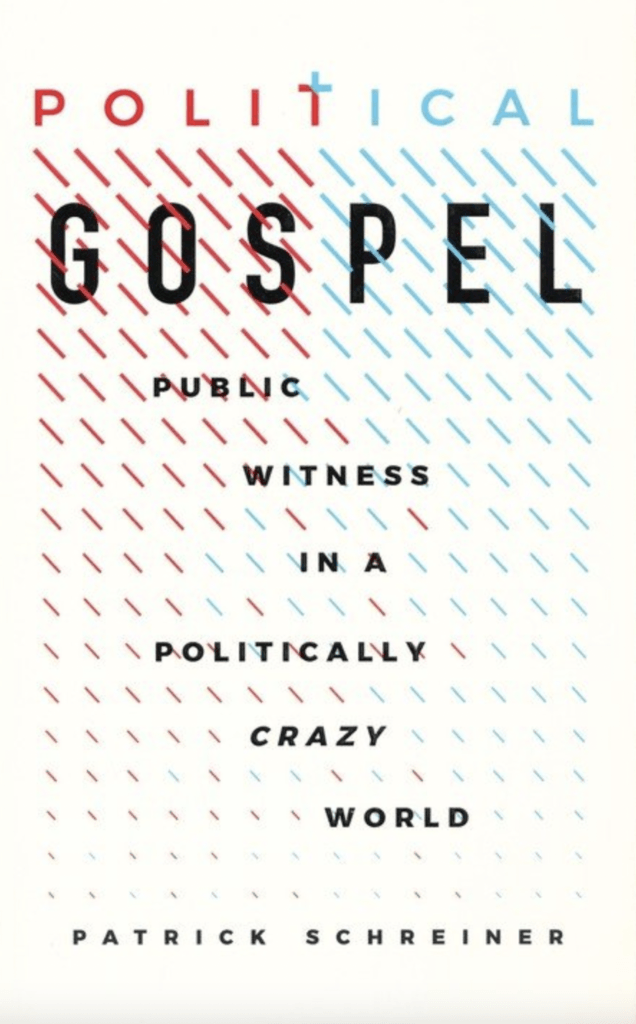

Editor’s Note: This post is excerpted with permission from Political Gospel by Patrick Schreiner, Copyright 2022, B&H Publishing. The book is available everywhere Christian books are sold.
KANSAS CITY, Mo. (BP) – Christianity is political. Though it might sound crazy in our supercharged political climate, I don’t think the average Christian is nearly political enough.
It has become a truism to state that Jesus didn’t come with a political message. As the common trope goes, though Israel expected a warrior-king to come riding on a white horse to overthrow Rome, He came with a spiritual message about their hearts. Jesus simply wants a relationship with you.
The problem is, this is a half-truth.
Jesus made a political announcement. He declared Himself to be King. We have one ruler to whom we are loyal.
Many still think “Jesus is King” means, “He is Lord of my life.” We forget Jesus is more than that; he is the King of kings.
Jesus was not “conservative” or “progressive,” but we must not miss the politics of Jesus. The whole biblical storyline can be put under the banner of politics.
- God put humans here to rule the earth.
- Sin is insurrection.
- Redemption is the offer of amnesty and citizenship in a new kingdom.
- Restoration is the empire come.
Rule out politics, and you throttle the proclamation of God’s saving power. Almost all the vocabulary of salvation (justification, peace, faithfulness, and kingdom of God) has a political dimension. The substance of Christian hope at its foundation is political. Thus, Jesus was not merely urging a revolution in personal values. He was not aloof to political concerns; it was the very purpose of His coming.
I hope to show you that the spheres of religion and politics are not only partially overlapping, but completely and wholly overlapping. Yet, maybe not in the way you think.
Politics defined
When you hear me arguing for a more “political” understanding of the Gospel message, you might mistakenly assume a few things.
First, you might think I’m speaking about a partisanship. Many equate being political with being partisan, but politics is larger than partisanship. I’m not arguing we should do more wheeling and dealing along party lines, or that pastors should endorse candidates. I’m not arguing Jesus can be smuggled into one of our political parties or that preachers should be more like politicians. That is not what I mean by “political.”
Second, you might think I’m arguing for the merging of church and state. While instituting Christian law into our political processes is a complex topic, we need to recognize the authority of the church and the authority of governing officials are distinct. We must not imitate imperialist forms of religion: the Spanish Inquisition, Charlemagne, the cross-carrying conquistadors, the Nazi co-option of Christianity – these are all corruptions of Christianity’s political vision. We have seen through history that using political power to implement God’s law ends in disaster.
If I don’t mean these things, then what do I mean?
My subject is politics in the historical sense of the word. I mean politics in terms of public life, the ordering of society, enacting justice, and the arranging of common goods.
“Political” simply means the activities associated with the organization and governance of people. It has to do with rulership and who has the right to order our lives. It is what happens in the public domain. To paraphrase Augustine, politics is people bound together by common loves.[1]
Politics comes from the Greek word polis which means city, or politikia meaning the affairs of the cities. In some ways, “a political gospel” simply means a public reality, and the governance of that public activity, as opposed to a private or individualistic one.
God is sovereign over the whole world, not merely the inner reaches of the human heart. His project includes the ordering of society, of public life, the establishment of a coming city, and even its present manifestation in the church.
But I’m also not merely suggesting Christianity has political implications. Christianity is itself a politic.
It is an all-encompassing vision of the world and human life. This all-encompassing vision is meant to be enacted in the church, showcased to our neighbors, and spread to the world.
Politics answers the questions: How do we live together? How do we deal with money? How do we treat our enemies? What is authority? How should we love? Whom should we love? What does it mean to be human? How do we form communities? What is justice? Who is in charge? And how do we disagree?
Politics is simply how we partner together for the flourishing of humanity and the world. We must open the horizon of politics past partisanship and allow God to have His say again. Christian politics concerns how we integrate our confession that Jesus is Lord with our call to love our neighbors.
Many people wonder if Jerusalem has anything to do with Athens, but it should also be asked whether Bethlehem has anything to say about Rome? The answer is actually quite easy.
King Herod, the puppet of Rome, didn’t kill the baby boys in Bethlehem because a spiritual guru was born. He killed them because a new Ruler had arrived, and he knew his days were numbered.
That is why Jesus was crucified on a Roman cross. Why Peter was crucified by Nero upside-down. Why Paul was beheaded by the same Caesar. Their messages were the tremors of a new regime.
[1] Augustine, City of God, in Nicene and Post-Nicene Fathers, Series 1.















